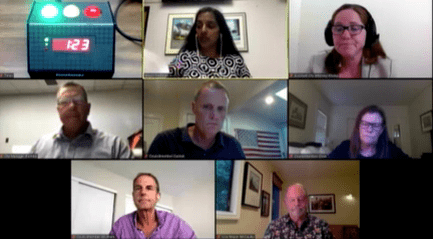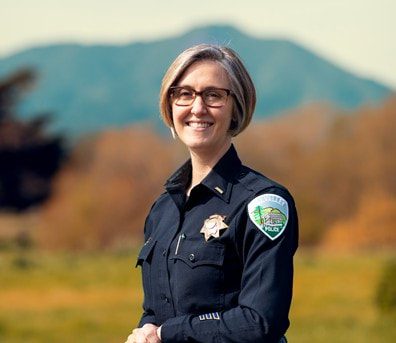 Mill Valley City Council and staff.
Mill Valley City Council and staff.
Councilmembers continued to pledge their commitment to do the hard work and listening necessary to make impactful change on systemic racial inequality in Mill Valley. But the response from many residents and community activists was continued frustration with a perceived lack of urgency, despite protestations to the contrary from councilmembers.
“The City of Mill Valley is ahead of every other city in Marin on these issues,” Vice Mayor John McCauley said. “I know there is a lot of angst around this. But once the facilitator launches and spends a small amount of time getting situated, our five councilmembers are as committed as any in this county to address these issues.”
DEI Task Force Facilitator
Fifty-five people have expressed interest in serving on the task force, city officials said. The selected group will then create forums for community members to share their experiences, recommendations, and proposed solutions for addressing the issues of inequities and injustices affecting Black and people of color in Mill Valley.
“We were expecting it to be a conversation,” June Cooperman, co-founder of the Mill Valley Community Action Network, said about the selection of Patton. “I’m personally insulted and offended by your lack of recognition that we have a plan to discuss these issues.”
City Manager Alan Piombo assured those concerned that the city had not yet finalized the contract with Patton and that its details will be made public as soon as it is.
Patton, who was born and raised in the Bronx, New York, in a racially, ethnically and culturally diverse environment, has worked in education, nonprofit, and corporate settings in the US and abroad for more than 20 years. She has been a facilitator, executive coach, and Diversity, Equity and Inclusion consultant, and has worked to build community relationships, city officials said in announcing the selection. See more on her background here.
“Our very humanity is a function of our ability to join together in solidarity around the ideal of, if one person is denied their inalienable rights to live with dignity, authenticity, respect, and the ability to turn their dreams into reality, we must band together in unison to right these wrongs,” said Patton, who will be introduced officially to the community at the Council’s Sept. 8th meeting. “Together, we turn conversations into actions that power toward common goals of racial equity and justice, while chasing away racism and anything that divides us. As the saint, John Lewis, who was a social activist and civil rights leader taught us, we must engage in ‘Good Trouble’ that will make our country finally what our ancestors died and lived for, a chance to finally take a ‘40 acres and a mule’ and build it into a life well lived.”
Use of Force Policies & #8CantWait
 Interim Mill Valley Police Chief Lindsay Haynes.
Interim Mill Valley Police Chief Lindsay Haynes.
“This is not a one and done report on the police department,” she said.
She added that the agency has already adopted most of the #8CantWait policies, which include de-escalation training, requiring officers to give a warning before shooting, requiring officers intervene to stop excessive force, mandating comprehensive reporting for using or threatening force and banning chokeholds and strangleholds. While MVPD does not ban shooting at moving vehicles, it is highly discouraged.
As a starting point, Haynes provided some basic details about MVPD, which serves approximately 14,000 residents within the City of Mill Valley (Marin County Sheriff’s Office serves an additional 16,000 residents within the broader unincorporated portions of the 94941 zip code.
The agency has 18 sworn officers and 6 staff members, with sworn police officers divided into four patrol teams with each officer working 12-hour shifts, 3-4 officers on a shift at a time – either 6am-6pm or the opposite – including one sergeant, one corporal and two officers. Haynes noted that MVPD has “released” three officers over the past five years because “they were not a fit” and “not up to our standards.”
MVPD has handled 83,100 incidents since Jan. 1, 2016, an average of approximately 18,000 calls annually, including “anytime an officer is requested by a member of the public, conducts self-initiated activity, makes a traffic stop, or conducts extra patrol or community policing activity. These calls consist of everything from a barking dog complaint, to a municipal code violation, traffic stop, petty theft, or burglary, to a violent assault or robbery.
Over that span, MVPD made 885 arrests, used control holds 23 times, brandished guns and Tasers 42 and 17 times, respectively, and discharged Tasers and guns five times and two times, respectively. Both cases of gunfire were for incidents involving animals, the report indicated.
- Require De-escalation – De-escalation is required, both by MVPD policy and by state law, when feasible. In addition, “officers should consider that taking no action or passively monitoring the situation may be the most reasonable response to a mental health crisis.” “We do that every day,” Haynes said. “It doesn’t mean it’s a use of force call – it could be neighbors arguing or a traffic accident when two parties are very upset with each other. Haynes said that in addition to required police academy training and a 20-week field training program, MVPD officers must do a range of continued professional training on de-escalation strategies, crisis intervention and more, with some MVPD officers also taking the instructor courses that allows them to subsequently train their colleagues in-house. Haynes added that MVPD uses Lexipol software to continually update department policies to ensure that all policies are aligned with continuously updated state and federal law.
- Require Warning Before Shooting – MVPD policy says that an officer “may use deadly force to apprehend a fleeing person for any felony that threatened or resulted in death or serious bodily injury, if the officer reasonably believes that the person will cause death or serious bodily injury to another unless immediately apprehended. Where feasible, the officer shall, prior to the use offorce, make reasonable efforts to identify themselves as a peace officer and to warn that deadly force may be used, unless the officer has objectively reasonable grounds to believe the person is aware of those facts.”
- Duty to Intervene – State and federal law and MVPD policy states that officers are required to intercede why see another officer using force that is clearly beyond that which is necessary, as determined by an objectively reasonable officer under the circumstances.”
- Require Comprehensive Reporting – Much of the focus from both the Council and the public was on implementation of the tools spurred by AB 953: The Racial and Identity Profiling Act (RIPA), which requires California law enforcement agencies to begin “collecting and reporting data on complaints that allege racial or identity profiling,” as well as “perceived demographic and other detailed data regarding pedestrian and traffic stops, including “the perceived race or ethnicity, gender, and approximate age of the person stopped, as well as other data such as the reason for the stop, whether a search was conducted, and the results of any such search.” Law enforcement must implement that RIPA data collection by 2023, and Haynes reported that while MVPD does not yet have capability to do record the data and transmit it to the RIPA board, “we can explore capturing that data and holding it in house for now,” and “we can get that data out there” long before the requirement of 2023 for agencies of MVPD’s size. Councilmembers expressed deep concern about reports of Mill Valley being dubbed “the zone” for many years by residents and visitors of color who’ve said they faced heightened scrutiny simply because of their race and presence in Mill Valley at the time. “2023 seems like a lifetime away from now,” Carmel said. “Let’s think through more clearly what we can do to make that happen sooner.”
- Ban Chokeholds & Strangleholds – Haynes said MVPD already did not support the use of chokeholds or strangleholds. On June 5, Gov. Gavin Newsom called for a ban on police use of the carotid restraint, a technique used to restrain people by compressing their carotid artery, a tactic “that literally is designed to stop people’s blood from flowing into their brain,” Newsom said. He said the state must ban “strangleholds that put people’s lives at risk.” One day later, MVPD eliminated the use of the carotid restraint as a “control hold” and updated department policy to reflect that it “may only be used in a deadly force encounter only as a means of last resort.
- Ban Shooting at Moving Vehicles – Haynes said shooting at moving vehicles is not “currently prohibited by MVPD policy but is strongly discouraged and regarded as a “particularly dangerous and ineffective tactic.” “This must be categorically banned,” the report stated. MVPD policy also indicates that “officers should move out of the path of an approaching vehicle instead of discharging their firearm at the vehicle or any of its occupants.”
- Require Use of Force Continuum – “It’s very dangerous and doesn’t work – an outdated model,” Haynes said. A number of deadly use of force incidents in 2018 and 2019 sparked a “robust dialogue to come up with terminology that would allow officers to respond appropriately in a dynamic situation that would not require a step by step process,” Piombo added. In her report, Haynes indicated that officers “must have an understanding and true appreciation for their authority and its limitations, and that “vesting officers with the authority to use reasonable force” “requires monitoring, evaluation, and a careful balancing of all interests.” Haynes said that officers must file a “use of force” report within 24 hours of the incident.
- Exhaust All Alternatives Before Shooting – Haynes said MVPD requires a warning before shooting and uses a verbal warning in all situations before using deadly force. Officers are not allowed to use deadly force against a person based on the danger that person poses to him/ herself, if an objectively reasonable officer would believe the person does not pose an imminent threat of death or serious bodily injury to the officer or to another person.” MVPD also requires officers to report every use of force application, and body cameras must be worn, and stay on, at all times.
The report sparked a lively discussion on nearly all of the #8CantWait recommendations. Frank Leidman, a member of the Mill Valley Action Community Network, said he was concerned the report did not break down the use-of-force incidents by race and did not classify brandishing a weapon as a use-of-force incident.
“I know there are a lot of 911 calls that come in and about barking dogs and kids on playgrounds – we are not sending police officers out to barking dogs, right?” asked Councilmember Tricia Ossa.
“This is just like the conversation the rest of the country is having,” Haynes replied. “We’re looking at the types of calls we can move away from in Mill Valley, such as having a code enforcement officer or our community services officer respond to those.”
Local resident Frank Liedman asked the city to create an independent oversight panel on MVPD, particularly on the RIPA data. Councilman Jim Wickham, who spent 37 years with MVPD, said that the council should serve as the oversight for the agency and asked Haynes to provide the council with monthly reports on the police department in the form of a publicly available dashboard.
Resident Veronica Wilson encouraged MVPD to move quickly than required on RIPA data. “It seems like it’s very much in the realm of possibility to start collecting that data sooner,” she said. “It’s about uncovering systemic biases.”
Resident Kyra Payne questioned why Mill Valley needs four armed officers on duty at a time. “It seems really excessive given the amount of crime we have here,” she said. “What if half of those officers were not officers and instead were two EMTs or social workers? Anytime a police officer shows up wearing combat boots in a full uniform and has a weapon, that is escalation.”
“I’ve worked here for 16 years – I love this department and I hope to put in 16 more,” Haynes said. “We have a great group of people here that are trying to do their best and working to be as progressive as possible. This report absolutely does not cover everything. We look forward to further direction from council and the task force in order to bring about that information.”
“I’m glad that we’re having this discussion as a community but we will take the time to do this right and it’s not going to happen overnight,” Wickham said. “I will be the first person to criticize our department if they go astray. I will say that we are not going to defund the police department – that’s not going to happen.”
“I am open to having a deliberative evaluation of the police department to see if there are areas we can truly get better on,” Piombo said. “But we’re not getting rid of mehe police department anytime soon.”
“This will be the first of many discussions we have about the police in this community,” Mayor Sashi McEntee said.

